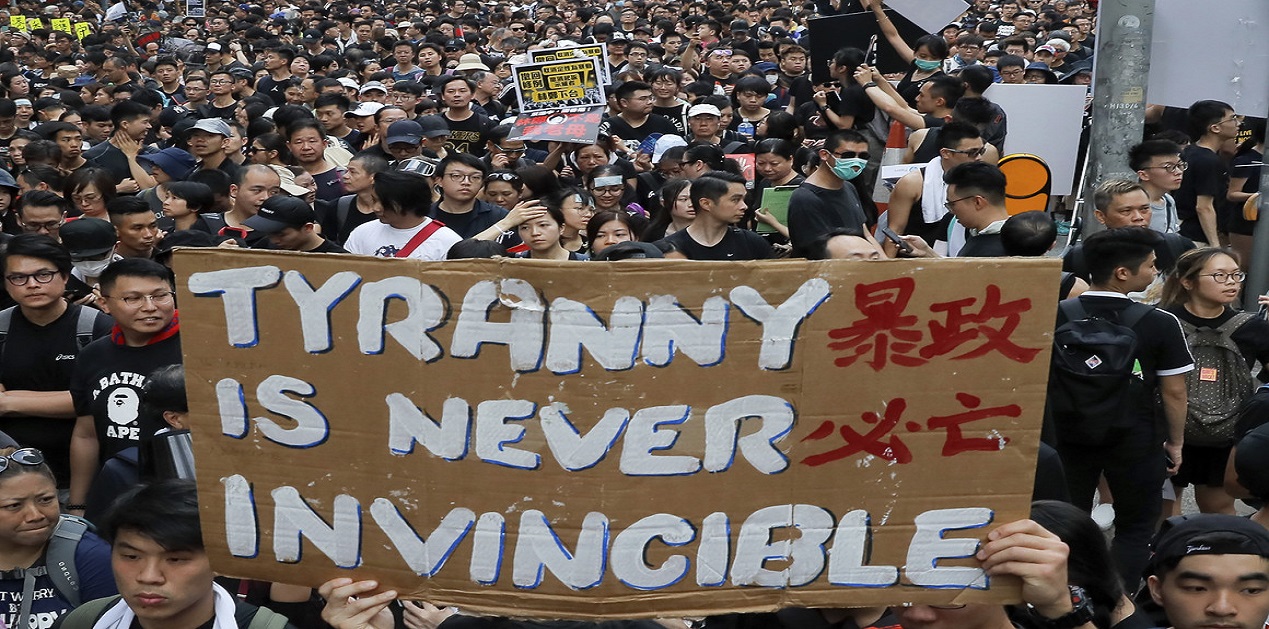Introduction
The 2019 Hong Kong (HK)’ protests were one of the biggest street protests in the last three decades. The protests were against the Fugitive Offenders and Mutual Legal Assistance in Criminal Matters Legislation (Amendment) Bill 2019, also known as Extradition Bill,1 which was introduced by the Government of HK. The proposed bill was publicly criticised at-arge, fearing that individuals would be subject to uninformed detention, unfair trial and torture under China’s judicial system. Hundreds of thousands of people came out on the streets of HK on 09 June 2019.
Initially, the protestors were demanding withdrawal of the extradition bill. However, HK Government’s actions and inactions towards its citizens further fuelled the protests and shaped it as violent. As of now, Carrie Lam, the Chief Executive of the HK Government, has suspended the bill and called the bill “dead”.2 However, neither is the bill withdrawn nor did Carrie Lam resigned as per the popular demand of the protestors. This article analyses the event in three sections: the first section tells about the historical progression of the protests; the second section discusses the legal perspective on the bill and the amendments associated with it. And finally, the third section of this article elaborates the three contending perspectives of the HK, China, and Taiwan regarding the consequences of the amendments proposed in the Extradition Bill.
Contextual Background
Currently, HK is a part of People’s Republic of China (PRC), also known as China, but it is also a semi-autonomous region. The history dates back to the period when HK was a remote part of the British Empire. After being under 156 years of the Colonial rule, it developed into a global business hub in late 1980s. In 1984, the United Kingdom (UK) and PRC signed the “Basic Law” with a discourse on the future of HK.3 Basic law clearly mentioned that after the completion of the lease period of 99 years, the HK would maintain “high degree of autonomy” and, would “not practice socialist system” rather continue with the “Capitalist system” for the next 50 years.4 The law further included that in 1997, HK would revert to China as a part of “One Country, Two Systems” formula.5
On 01 July 1997, HK was returned to China under the framework of "one Country, Two Systems", where the "Basic Law" constitution guarantees to protect the democratic institutions which makes the Hong Kong separate from the Communist-ruled Mainland China, for the next 50 years. 6 In 2003, HK’s leaders introduced a legislation that would prohibit the acts of treason and subversion against the Chinese Government.7 The bill favoured laws that can be used to charge dissidents in the Mainland. This outraged around half a million people who turned out to protest against the same bill. As a result of the hold back, further action on the proposal came to a standstill.
According to the Basic Law, the goal for the Hong Kong voters is to achieve democracy. However, in 2007, China had stated that the universal suffrage in election for the Chief Executive cannot be implemented until 2017. This resulted with an adoption of the Beijing-backed electoral changes. With this, the Chief Executive's Selection Committee was expanded and more seats were added for the lawmakers which were elected by direct vote. Further, it witnessed a divide between those who supported the reforms and others who believed that it was only to delay full democracy while reinforcing a structure that favoured Beijing.
In 2014, the Chinese Government introduced a bill allowing HK residents to vote for their leader in 2017, but with one major condition that the prospective candidates must be approved by Beijing.8 Pro-democracy lawmakers were incensed with the bill which they called as an example of "fake universal suffrage" and "fake democracy". The move triggered a massive protest as crowds occupied some of the HK's most populous districts for 70 days. In June 2015, HK legislators formally rejected the bill and hence the electoral reforms stalls. The present Chief Executive of the Hong Kong Government— Carrie Lam, widely seen as the Chinese Communist Party's favoured candidate as she was “hand-picked” in 2017 by a committee comprising of 1200 members mostly dominated by pro-Beijing elites.
The infamous 2018 murder case in Taiwan triggered the extradition debate in the HK. A Hongkonger man— Chan Tong-kai who was summoned for murdering his Hongkonger girlfriend, Poon Hiu-wing in Taiwan, was arrested in HK. As per the existing legal arrangements and lack of extradition law, the HK police did not charge Chan Tong-Kai for the murder committed in Taiwan, but got him convicted on money laundering charges for using Poon’s credit cards after her death.9

Table 1: Timeline of the 2019 Hong Kong Protests10
Amendments for the extradition law were proposed in February 2019. The proposed legislation, however, triggered a huge protest, with organisers putting the turnout at one million, and a stand-off that forced the legislature to postpone debate on the bills.11 The Secretary for the Security Bureau and the officials of the Department of Justice were later invited to introduce and explain the provisions and items of offences covered by the relevant laws to different sectors of the society, including the public, in particular to those who were “worried” that they might breach the laws inadvertently because of a lack of understanding. 12
The Proposed Extradition Bill
Universally, an International law does not initiate a duty to extradite. ‘Extradition’ means a judicial commitment of one State (the requested State) to capitulate a person which is being wanted by another State (the requesting State).13 It can be processed only if there is a bilateral or multilateral extradition agreement, or if the requested state is a party to an international instrument which institutes a duty to extradite, as is the case with respect to specific offences.14 But in case of the HK and China, neither there is a bilateral agreement nor an established multilateral agreement to perform the duty to extradite a criminal or ‘wanted’ individual.
The Hong Kong’s Security Bureau15 received different views on the proposals related to the bill. By 04 March 2019, about 4,500 written submissions were received, including about 3,100 in favour and about 1,400 in opposition to the proposals. Before evaluating the consequences, one must understand the key provisions of the bill.
The Security Bureau had decided that the case-based surrender arrangements will only apply to 37 items of offences based on their existing description in Schedule 1 of Fugitive Offenders Ordinance (FOO). The case-based surrender arrangements are mainly for offences which are punishable with imprisonment for more than three years and triable on indictment in HK. Following are the nine items of offences that are excluded in the Schedule 1 of FOO’s case-based surrender arrangement:- 16
- Item number 10 – offences against bankruptcy law or insolvency law;
- Item number 11 – offences against the law relating to companies including offences committed by officers, directors and promoters;
- Item number 12 – offences relating to securities and futures trading;
- Item number 14 – offences against the law relating to protection of intellectual property, copyrights, patents or trademarks;
- Item number 21 – offences against the law relating to environmental pollution or protection of public health;
- Item number 27 – offences against the law relating to the control of exportation or importation of goods of any type, or the international transfer of funds;
- Item number 35 – offences involving the unlawful use of computers;
- Item number 36 – offences relating to fiscal matters, taxes or duties; and
- Item number 40 – offences against the law relating to false or misleading trade descriptions.
Contending Perspectives
China has been supporting the Hong Kong’s Chief Executive Carrie Lam’s decisions and the proposed Extradition Bill for various legal and legislative reasons. As per the Chinese claims, around 700,000 Hongkongers came out in support of the HK Government’s attempt to amend the fugitives’ law. According to them, the intentions behind the amendment have been misunderstood by the protestors. There are hundreds of criminals from different locations, who have conveniently used HK as a safe heaven using the loopholes in its legal systems.17 The amendment would have enabled HK to send the criminals or the fugitives back, on case-by-case basis. This amendment proposal would have covered not just China, but also around 170 other countries.18 The Chinese media has been seeing the protests as a mere attempt by opposition party in the HK and its foreign allies.
The opposition is not just against the Extradition Bill, but also against the Hong Kong’s Chief Executive— Carrie Lam, who is seen as a mere puppet in the hands of the Communist party of China. The bill is seen as a threat to the HK’s democratic state structure which they have struggled to preserve since 1997. According to them, the problem with the new law is that it may open the door for anyone, including political agitator or civil rights pressure groups in conflict with the Chinese Government may get arrested with addition of fabricated charges in HK and sent to the Mainland as a legal protocol. The new law will be applied to the HK’s citizens, foreign residents and even people passing through on business or as tourists. Further, Sophie Richardson, Director, the Human Rights Watch (China), backed the argument by stating that “the proposed amendments in the extradition bill would put any individual in HK at risk who is doing any work including research on Human Rights in China. Under this Extradition Bill, no one will remain safe, including social activists, Human Rights advocates, and journalists”.19
Taiwanese President, Tsai-Ing-wen has expressed concern on the developments of the situation in HK. In an official statement released on 13 June 2019, Tsai-Ing-wen stated that “the democratic protests in Hong Kong not only made Taiwanese cherish their existing democratic system and way of life even more, but also made it clear to them that the ‘one country, two systems’ model was not viable.” President Tsai also emphasised that the use of individual extradition mentioned in the amendment to the Fugitive Offenders Ordinance was an excuse to make legal amendments. In her statement, President Tsai expressed strong support to the people of HK in their pursuit of further democracy and freedom.
Conclusion
The entire extradition protest can be seen as an extension of the ‘One Country Two Systems’ debate. On close analyses, one can easily discern the fact that more than the law, the debate is regarding China’s intensions behind it. The protests regarding the bill have now evolved into a protest for democracy and the freedom of speech.
China wants to believe that the HK protests are an attempt of foreign allies and opposition parties to generate anti-China sentiments. Whereas the HK protestors and Taiwanese see it is as China’s attempt to weaken their democratic structures and gradually take away the autonomy that both of them enjoys.
References:
- Fugitive Offenders and Mutual Legal Assistance in Criminal Matters Legislation(Amendment) Bill 2019 Available at : https://www.legco.gov.hk/yr18-19/english/bills/b201903291.pdf
- Extradition Bill is “Dead”, says Hong Kong Leader, Carrie Lam, 8 July 2019; Available at:https://www.nytimes.com/2019/07/08/world/asia/carrie-lam-hong-kong.html
- Basic Law, https://www.basiclaw.gov.hk/pda/en/basiclawtext/chapter_1.html
- Ibid.
- One Country Two System’s Principle Available at:
https://www.basiclaw.gov.hk/en/publications/book/15anniversary_reunification_ch1_1.pdf - Ibid.
- Basic Law, Article 23, The Hong Kong Special Administrative Region shall enact laws on its own to prohibit any act of treason, secession, sedition, subversion against the Central People's Government, or theft of state secrets, to prohibit foreign political organizations or bodies from conducting political activities in the Region, and to prohibit political organizations or bodies of the Region from establishing ties with foreign political organizations or bodies. Available at: https://www.basiclaw.gov.hk/pda/en/basiclawtext/chapter_2.html
- Mass Street Protests are an Expression of Hong Kong’s Identity, The Guardian, 13 June 2019 https://www.theguardian.com/world/2019/jun/13/mass-street-protests-are-an-expression-of-hong-kongs-identity
- The Murder Case that Lit the Fuse in Hong Kong, The New York Times, 15 June 2019 https://www.nytimes.com/2019/06/15/world/asia/hong-kong-murder-taiwan-extradition.html
- Data extracted for the timeline from: “Timeline- Key dates for Hong Kong extradition bill and protests”, Reuters, 01 July 2019, Available from: https://www.reuters.com/article/uk-hongkong-extradition-timeline/timeline-key-dates-for-hong-kong-extradition-bill-and-protests-idUSKCN1TW14F
- Mass Street Protests are an Expression of Hong Kong’s Identity, The Guardian, 13 June 2019 https://www.theguardian.com/world/2019/jun/13/mass-street-protests-are-an-expression-of-hong-kongs-identity
- Legislative Council of Hong Kong, Fugitive Offenders Ordinance (Chapter 503) and Mutual Legal Assistance in Criminal Matters Ordinance (Chapter 525)- Fugitive Offenders and Mutual Legal Assistance in Criminal Matters Legislation (Amendment) Bill 2019, SBCR 1/2716/19, Available from: https://www.legco.gov.hk/yr18-19/english/bills/brief/b201903291_brf.pdf
- Sibylle Kapferer , “Legal And Protection Policy Research Series, The Interface Between Extradition And Asylum”, UNHCR Consultant (UNHCR), p.5., Nov 2003 https://www.un.org/ruleoflaw/files/Interface%20btwn%20extradition%20and%20asylum.pdf
- Ibid. <.li>
- The Security Bureau is a body of the Government of Hong Kong which is responsible for a range of official activities including security-related policies, from the maintenance of law and order, exercising immigration and customs control, rehabilitating offenders and drug abusers, and providing emergency fire and rescue services. Available at: https://www.sb.gov.hk/eng/about/welcome.htm
- Legislative Council of Hong Kong, Fugitive Offenders Ordinance (Chapter 503) and Mutual Legal Assistance in Criminal Matters Ordinance (Chapter 525)- Fugitive Offenders and Mutual Legal Assistance in Criminal Matters Legislation (Amendment) Bill 2019, SBCR 1/2716/19, Available from: https://www.legco.gov.hk/yr18-19/english/bills/brief/b201903291_brf.pdf
- Closing of Extradition loophole strengths rule of law in HK: China Daily Editorial, 9 June 2019 http://www.chinadaily.com.cn/a/201906/09/WS5cfd0916a3101765772301f8.html
- Fugitive surrender: Rights and responsilities, Available at : https://www.chinadailyhk.com/articles/186/73/64/1560307116859.html
- Hong Kong-China extradition plans explained”, BBC News, 10 June 2019, Available from: https://www.bbc.com/news/world-asia-china-47810723
Image Source: https://static.politico.com/dims4/default/72e2690/2147483647/resize/1160x%3E/quality/90/?url=https%3A%2F%2Fstatic.politico.com%2F1a%2F7a%2Fab8eedb7456cbc95c83bab2c5108%2Fwebp.net-resizeimage%20%2875%29.jpg













Post new comment